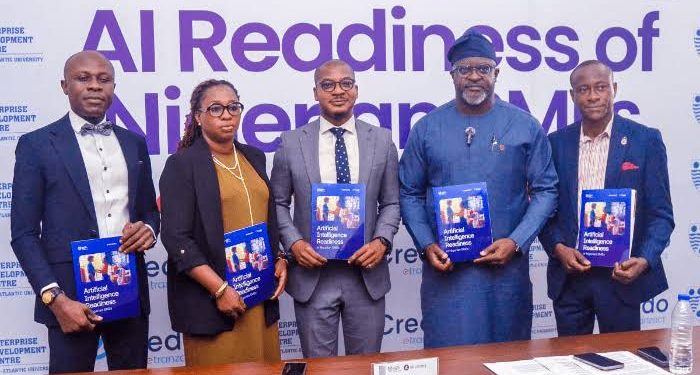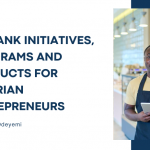The Enterprise Development Centre (EDC) of Pan-Atlantic University and eTranzact International Plc have jointly unveiled a groundbreaking report assessing the artificial intelligence readiness of Nigerian Small and Medium Enterprises, in a move aimed at accelerating AI adoption and boosting business competitiveness across the sector.
The report, launched at EDC’s headquarters in Lagos, underscores the vast potential of AI to transform Nigeria’s SME landscape by reshaping industries, redefining business models, streamlining operations, and deepening customer engagement. It also examines the current state of awareness and adoption of AI tools among SMEs, identifying both the opportunities and barriers that stand in the way of widespread use.
Speaking at the event, eTranzact’s Managing Director and Chief Executive Officer, Niyi Toluwalope, said the collaboration reflects a shared commitment to empowering Nigerian businesses. He noted that with more than 39 million SMEs contributing significantly to the nation’s GDP, economic growth, and innovation, ensuring they are equipped to harness AI technologies is crucial for long-term sustainability. “This research sheds light on both the aspirations and realities of entrepreneurs navigating a rapidly evolving digital economy. While enthusiasm for AI-powered solutions is high, there remains a gap in awareness, access, and contextual relevance,” he said.
EDC’s Director of Programmes and Partnerships, Olawale Anifowose, added that while AI awareness is growing — particularly in the ICT and creative industries — adoption levels remain low in other sectors such as agriculture and fashion. He stressed the importance of tailored awareness programmes and accessible solutions to close this gap.
According to EDC’s Lead for Monitoring, Evaluation, Research and Learning, Stanley Ibeku, the study was comprehensive, combining quantitative surveys and qualitative focus groups across all 36 states and the Federal Capital Territory, with over 5,500 participants offering insights into AI knowledge, perceptions, and readiness.
The report outlines a series of recommendations to bridge the readiness gap. It calls for government investment in locally relevant AI solutions, promotion of indigenous tools, and creation of AI-friendly policies including tax incentives, simplified regulatory processes, and robust data privacy safeguards. The private sector is urged to provide affordable, user-friendly AI tools and invest in skills development through partnerships, training programmes, and educational initiatives.
By highlighting both the current realities and the pathways forward, the EDC–eTranzact partnership aims to position Nigerian SMEs to compete more effectively in the global economy. Stakeholders believe that fostering AI readiness now will not only enhance operational efficiency but also strengthen resilience, enabling businesses to better navigate the challenges of a rapidly changing marketplace.










